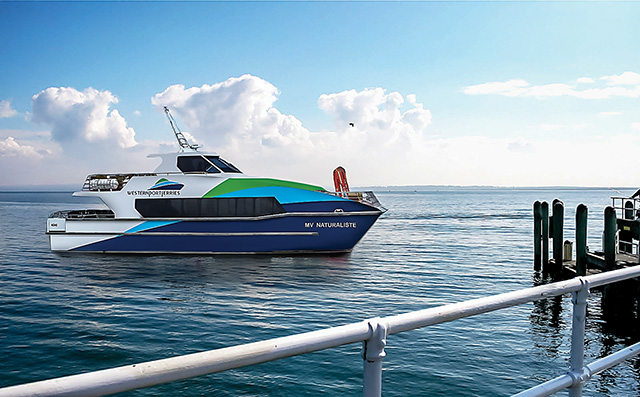THE lengthy process of formulating a business case for a car ferry from Stony Point to Cowes, Phillip Island goes a step forward next month with a series of public and industry meetings.
On Friday 6 October industry representatives and members of the public can attend “information gathering” meetings at Crib Point.
Compilation of the business case for the ferry service is being co-ordinated by Brisbane-based consultants Earthcheck, described as being an international tourism advisory group.
The state government has given $200,000 to help Mornington Peninsula and Bass Coast shires “understand and define the community, environmental and economic contribution and impacts of a car ferry between Cowes and Stony Point, including a passenger only service to French Island”.
A joint news release from the two shires – which have each put in $25,000 – says “the impacts and opportunities of expanding the current passenger ferry to a car ferry service will be identified as part of the business case to be prepared for the Victorian government”.
“The Victorian government, in partnership with Bass Coast and Mornington Peninsula Shire Councils, has appointed a team of transport and business case development professionals to work through the process with our communities and stakeholders to understand the feasibility and impact of this project, and the opportunities it could create,” Bass Coast mayor, Cr Pamela Rothfield said
The peninsula’s mayor, Cr Bev Colomb said the ferry plan – a “wonderful initiative” – conformed to the shire’s 2016-2019 economic development strategy and the peninsula’s regional tourism board’s 2014 destination management plan.
As previously reported in The News (“Business case bid for ferry” 2/5/17) an economic study produced six years ago put the overall cost of the project at $47 million and predicted it would lead to greater employment on Phillip Island and the peninsula during and after construction of two new ferry terminals.
A pre-feasibility study by consulting engineers Arup in 2003 was followed in 2008 by Bays and Maritime Initiative – Stony Point to Cowes Vehicle Ferry, by Maunsell Australia.
In the July 2010 economic impact assessment commissioned by Bass Coast Essential Economics estimated the ferry service would carry 109,500 cars (323,000 passengers) in its first year increasing to 127,750 cars (375,000 passengers) in a decade.
The Essential Economics report was based on a 50-car ferry running from Stony Point and Cowes every two hours between 8am and 5pm.
The cost of building a new pier and infrastructure at Stony Point is put at $21m and $25.8m at Cowes. Both piers would be alongside the existing piers.
The Essential Economics 2010 study said 285 effective full time jobs would be created during the construction phase of the terminals at Stony Point and Cowes which “will ensure continual low unemployment rates in Bass Coast and Mornington Peninsula, noting that both shires have relatively high proportions of resident workers occupied in construction-related activities”.
Once built, the ferries would require 14 full time staff and create 27 “indirect” full time jobs. An additional 98 jobs would be created in the wider tourism industry. The increased number of visitors to the peninsula and Phillip Island will see $14m injected into the local economies in the first year growing to $16.3m by the tenth year.
The Friday 6 October information gathering meetings will be held at Crib Point Community Hall, starting with the industry meeting 9.30am-11am; the community meeting 11.30am-1pm; followed by drop-in sessions 4pm-7pm.
First published in the Western Port News – 19 September 2017


